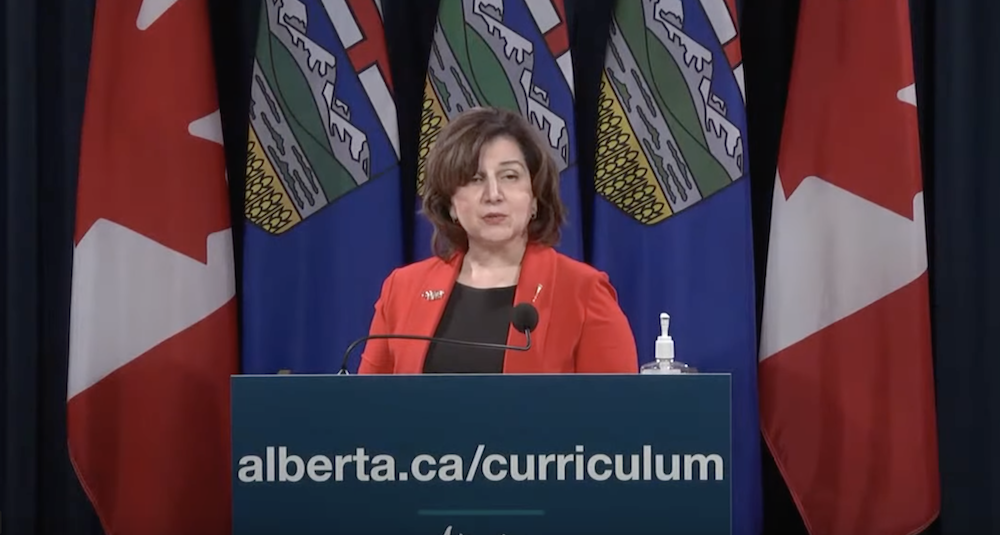Alberta Education Minister Adriana LaGrange yesterday executed a reluctant partial climbdown from Alberta’s controversial draft kindergarten-to-Grade-6 curriculum, announcing the Kenney government will delay implementation of changes to how four subjects are taught in elementary schools.
Educators mostly cautiously praised the announcement as a step in the right direction.
Or, as Alberta Teachers Association President Jason Schilling put it, “a step in the right direction toward fixing this disastrous curriculum.” (Emphasis added.)
Schilling added: “There are still significant issues with the proposed content for the language arts, math, and phys-ed and wellness programs” — all of which will still be implemented next September under LaGrange’s plan.
The almost universally reviled rewrite of the K-6 social studies curriculum will be among the subjects to be placed on the back burner for the time being, Lagrange said. The other three are science, fine arts and French immersion.
“We have listened to the valuable insights provided by parents, education stakeholders, teachers and Albertans and are making significant content and implementation changes to reflect this,” LaGrange said in the government’s press release and repeated at her news conference.
Not that she had much choice. The social studies curriculum in particular has become an international cause célèbre among appalled curriculum experts, almost universally panned as age-inappropriate, outdated, Eurocentric, jargon-riddled, inaccurate and unconcerned with developing critical thinking skills, not to mention rife with plagiarism.
It is, summarized University of Alberta social studies curriculum expert Carla Peck in the January/February 2022 edition of Alberta Views Magazine, ideologically driven and lacking even a basic understanding of how children learn.
The goal of the social studies curriculum draft appeared to be to return Alberta students’ attitudes and critical skills to the 1950s.
It seems to have been heavily influenced by Premier Jason Kenney’s own cranky pedagogical notions — perhaps influenced by ideas of his father, a private school teacher and principal — and those of his like-minded PhD historian friend and former political staffer Christian Champion.
Although he is not a curriculum expert, Champion was hired by the government to advise the Education Ministry on the social studies curriculum.
Peck, who also has a PhD, reminded her readers that Champion is “the editor of a fringe conservative history magazine,” and has published commentary downplaying the deaths of Indigenous children in residential schools and dismissing the teaching of Indigenous perspectives as a “fad” and “agit-prop.”
Of Alberta’s 61 school boards, 56 refused to pilot the draft curriculum, four agreed to try only some subjects, and one said individual teachers could pilot a subject if they felt like it, Peck reported. None of them would touch the social studies curriculum with the proverbial bargepole!
No teachers and almost no curriculum experts were involved in the curriculum rewrite, she also noted. By contrast, eight working groups made up of more than 350 teachers and experts had worked for several years on the broader K-12 curriculum draft started under the Progressive Conservatives and continued by the NDP. Kenney tore up that work after baselessly accusing the previous NDP government of infusing it with its ideology.
Facing an avalanche of well-informed criticism, the Kenney government obviously needed to do some damage control, at least for now.
It was not clear from LaGrange’s comments during her news conference if the delays announced yesterday constitute a genuine commitment to improve the curriculum or merely a strategic retreat to get past the next election before returning to implementation of what is clearly one of Kenney’s personal hobbyhorses, purging the educational system of “collectivist” notions taught by “liberal” teachers.
“Never forget that the reason the past draft was so bad is because this government failed to properly and meaningfully involve teachers in its development,” Schilling said at his own online news conference following LaGrange’s announcement.
“Despite today’s positive developments, all indicators suggest the government will continue to repeat this fundamental mistake,” he went on. “We released our comprehensive report of teacher feedback on curriculum in September, but still have not been invited to meet with ministry officials to discuss its content.”
“The minister is now announcing an implementation steering committee with no clear indication of how teachers will be represented,” Schilling added. “How can you realistically discuss implementation while the exact people tasked with implementation are locked out of the room?”
Readers should not imagine that this development marks the beginning of a rapprochement between the Kenney government and the Alberta Teachers Association, or even successful lobbying by the ATA, as some of the premier’s political allies claim.
Au contraire! It will provoke the Kenney government to double down on its attacks on the ATA, particularly the government’s plan to introduce legislation to split the ATA into two bodies by removing regulation of the teaching profession from its role as a union.
Schilling acknowledged this reality in his remarks. “The only reason changes are being announced today is because we stood up,” he said.
“Because we dared to stand up to them, the government is now attacking us on our professional side. But sharing our concerns about this flawed curriculum was driven by that professional side. Which is exactly why they want to de-professionalize the association and exactly why we cannot let them.”



